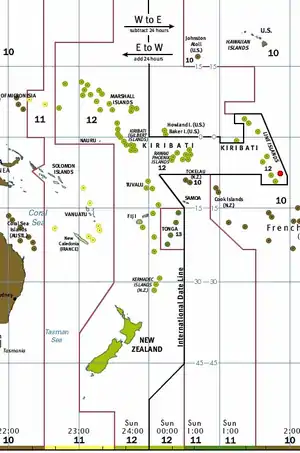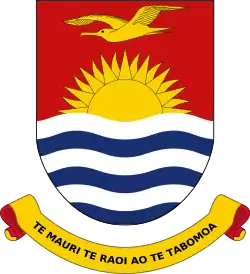Time in Kiribati
Kiribati, a country in Oceania comprising 32 atolls and reef islands and one raised coral island, observes three time zones, ranging from UTC+12:00 to +14.[1] Kiribati does not observe daylight saving time.[2]
| Time in Kiribati | |
|---|---|
| Time zone | Gilbert Island Time, Phoenix Island Time, Line Islands Time |
| Initials | GILT, PHOT, LINT |
| UTC offset | UTC+12:00, +13 and +14 |
| Standard meridian | None, passes through the equator, 180th meridian and 150°W meridian |
| Adopted | 1979 (+12) 31 December 1994 (+13 and +14) |
| Daylight saving time | |
| DST not observed | |
| tz database | |
| Pacific/Kanton, Pacific/Kiritimati, Pacific/Tarawa | |
The three given time zones are for the three primary island groups that form Kiribati, and their associated atolls: Gilbert Island Time (GILT; UTC+12:00), Phoenix Island Time (PHOT; UTC+13:00) and Line Islands Time (LINT; UTC+14:00).[3] UTC+14:00 is the most advanced time zone in the world, making Kiribati one of the first countries to celebrate a New Year,[4] although Samoa also observes UTC+14:00 during their daylight saving time.[5][6]
Although Kiribati spans both the equator and the 180th meridian, the International Date Line goes around Kiribati and swings far to the east, almost reaching the 150°W meridian.[7][8] This was the result of the Phoenix and Line Islands switching in 1994 from UTC−11:00 and −10 to UTC+13:00 and +14 respectively.
History

When the Republic of Kiribati was founded in 1979, it had three time zones: UTC+12:00 in the Gilbert Islands, UTC−11:00 in the Phoenix Islands and UTC−10:00 in the Line Islands. Gilbert was west of the international dateline and the Phoenix and Line Islands were east of it. This meant that the Gilbert Islands were a full day ahead of the eastern islands.[9]
For administrative purposes, the time zones had to be adjusted.[10] To solve it, the government of Kiribati introduced a change of date for its eastern half on 31 December 1994,[11] from time zones UTC−11:00 and UTC−10:00 to UTC+13:00 and UTC+14:00. Before this, UTC+13:00 and UTC+14:00 did not exist.[12]
The revision of Kiribati's time zone meant that the international date line in effect moved 1,000 kilometers (620 mi) eastwards to go around this country, so that the Line Islands, including the inhabited Kiritimati island, started the year 2000 on its territory before any other country on Earth, a feature the Kiribati government capitalised on as a potential tourist draw.[13][14]
IANA time zone database
The IANA time zone database in the file zone.tab contains three time zones for Kiribati. Data below is for Kiribati directly from zone.tab of the IANA time zone database. Columns marked with * are the columns from zone.tab itself:[15]
| c.c.* | coordinates* | TZ* | Comments | UTC offset | DST |
|---|---|---|---|---|---|
| KI | −0247−17143 | Pacific/Kanton | Phoenix Islands | +13:00 | +13:00 |
| KI | +0152−15720 | Pacific/Kiritimati | Line Islands | +14:00 | +14:00 |
| KI | +0125+17300 | Pacific/Tarawa | Gilberts, Marshalls, Wake | +12:00 | +12:00 |
References
- Kiribati at The World Factbook. Central Intelligence Agency. Retrieved 24 April 2021.
- Timezones in Kiribati. WorldData.Info. Retrieved 24 April 2021.
- Time Zones in Kiribati. TimeAndDate.com. Retrieved 24 April 2021.
- "Why do countries celebrate New Year's Eve at different times?". RTE. 30 December 2020. Retrieved 30 May 2021.
- Samoa opts for daylight saving, 28 November 2008. Radio New Zealand. Retrieved 9 May 2021.
- Time Zones in Samoa. TimeAndDate.com. Retrieved 9 May 2021.
- Maps of Kiribati. Retrieved 24 April 2021.
- Kiribati Islands. Pacific Islands Medical Aid, Inc. Retrieved 28 April 2021.
- Pearlman, Jonathan (29 December 2011) Samoa prepares to skip Dec 30. The Daily Telegraph. Retrieved 26 April 2021. (Subscription required)
- "Answers to all your questions about The Start of The New Millennium". Royal Greenwich Observatory. 2014. Retrieved 30 May 2021.
- Lane, Megan (10 May 2011) How does a country change its time zone?. BBC News. Retrieved 24 April 2021.
- Vermeulen, Andreas François (2018). Practical Data Science: A Guide to Building the Technology Stack for Turning Data Lakes into Business Assets. West Kilbride, North Ayrshire: Apress. p. 454. ISBN 978-1-4842-3053-4.
- Ariel, Avraham; Berger, Nora Ariel (2005). Plotting the Globe: Stories of Meridians, Parallels, and the International Date Line. Greenwood Press. p. 149. ISBN 0-275-98895-3.
- Letts, Quentin (25 January 1996) Pacific braces for millennium storm over matter of degrees. The Times. Retrieved 26 April 2021.
- Australasia at the tz database. Internet Assigned Numbers Authority (IANA). Retrieved 9 May 2021.
External links
- Time in Kiribati at TimeAndDate.com
